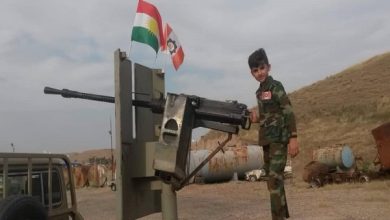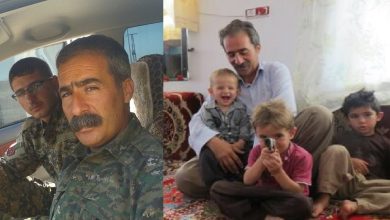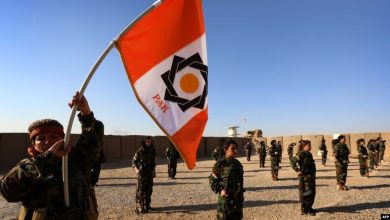Kazem Motaei: Regarding joining KOMALA, I must say I had no knowledge of this group whatsoever. I had no political literacy, nor did I show any interest in such matters
Human lives are influenced by social, economic, and cultural factors, and these can lead to major changes in an individual’s life path. The story of Kazem Motaei, a man who was once in critical economic and social circumstances, represents many individuals seeking a way out of their dire situations. His separation from his wife and financial pressures led him to make decisions directly related to his identity and future. Joining armed and dangerous groups like KOMALA, as an option to escape the crisis, highlights the deep social challenges individuals face in crisis-ridden societies. In this interview, an Iranian Kurdistan Human Rights Watch reporter will explore the reasons and circumstances that led Kazem Motaei to join KOMALA, and also analyze the social and economic impacts of this decision on his life.
Kazem Motaei was born in 1978 in Sanandaj. He is uneducated and currently works as a photographer and videographer. In 2022, due to debt and a very poor economic situation, and despite having two children (a son and a daughter, both now married), he separated from his wife. Guided by his wife’s nephew, Hamed Rahmani, he joined KOMALA and spent three months in a training camp. Because of his lack of education, he was mostly assigned to guard duty and cleaning tasks in the camp. After completing the training period, Mr. Motaei received a “Laynageri” (supporter) card and moved to Sulaymaniyah, where he worked as a laborer and street vendor. However, when he first attended KOMALA group meetings in Sulaymaniyah, the commanders announced that the camps were at risk of an Iranian attack and all Peshmerga members had to return to the KOMALA camps for defense and war. Upon hearing this news, Kazem Motaei decided to leave the group. In 2024, after nearly two years of accompanying and cooperating with the armed KOMALA group, he surrendered himself to Iranian border forces.
Question: Please introduce yourself and tell us what circumstances led you to decide to join KOMALA.
Kazem Motaei: I’m Kazem Motaei, born on February 24, 1978, from Sanandaj. Unfortunately, I’m uneducated and never went to school. Most of my life I’ve worked as a laborer, and for the past few years, I’ve been photographing and filming people’s events, mostly with rented cameras. I have two children, a daughter and a son, both married and living their own lives. 2022 was truly one of the worst years of my life. I had a lot of debt, and I couldn’t find any work. The pressure of life was so immense that my marriage ended, and we separated. Even though I had two children and seeing them was my greatest joy, I felt like I had lost everything. I was looking for an escape that could save me. That’s how I joined KOMALA. My membership was solely to escape debt and my difficult living conditions; I had no political or military intentions.
Question: What made you decide to join the KOMALA group? Did you have any prior knowledge of this group?
Kazem Motaei: Regarding joining KOMALA, I must say I had no knowledge of this group whatsoever. I had no political literacy, nor did I show any interest in such matters. One day, my ex-wife’s nephew, a boy named Hamed Rahmani, called me and said, “Kaka Kazem, you have nothing here, why don’t you come to this side of the border? There’s work here, they pay wages, and they help with immigration.” He said KOMALA had sent many people abroad. He explained that I first had to go to a training camp, and after a while, I’d be sent to Europe. Having lost everything, I saw this as a possible way out and agreed. So, I was deceived, hoping to immigrate to Europe by joining an armed group!
Question: How were the conditions in the KOMALA camp? Did they align with your expectations?
Kazem Motaei: Absolutely not! The conditions in the KOMALA camp did not align with my expectations at all. From day one, I realized everything was different from what I had imagined. Since I was uneducated, I didn’t understand anything in the political classes, and they quickly realized I was illiterate and assigned me to service tasks. That meant from morning till night, I was either cleaning the camp’s restrooms or standing guard. The camp wasn’t a place one could call “life.” It was crowded and full of people of different ages and cultures. The living facilities were also very poor. It was a military base with meager amenities! No one was close to anyone else, and everyone just thought about themselves. There were no human relationships between members. Everyone acted like robots. At night, we had to take turns on guard duty. I stayed there for three months, but I couldn’t bear it any longer. There were no wages, and none of the promises they had made materialized. They just gave me a “Laynageri” card, which indicated my support, and then sent me to the city of Sulaymaniyah.
Question: After moving to Sulaymaniyah, how were your living conditions?
Kazem Motaei: In Sulaymaniyah, I was no longer an official member of KOMALA. I was just a lonely individual with a “Laynageri” card that was useless. I started working as a laborer, doing whatever work I could find. For a while, I also sold goods as a street vendor in the market. Expenses were high, and I didn’t have a suitable place to sleep. I was always under pressure, and none of the KOMALA officials checked on me. It was as if only those three months mattered to them, and after that, I was no longer important. They had practically abandoned me with a worthless card! No one checked on the members, and our lives and well-being weren’t important to them. We had no wages, and we didn’t even think about the promise of immigration to Europe anymore.
Question: What made you decide to leave KOMALA and surrender yourself?
Kazem Motaei: The turning point for me was when I went to one of KOMALA’s meetings in Sulaymaniyah. In that meeting, one of the commanders said that the camps were at risk of attack from Iran and all forces, even supporters, had to return to the main headquarters. At that moment, I made my decision. I said, “I neither know how to fight nor am I looking for politics. I only came here for a morsel of bread, and I don’t want to die for something I don’t believe in. KOMALA didn’t value our lives; why should I give my life for it?!” Some time later, when I realized the situation had calmed down, I decided to return. I managed to make contact with great difficulty and finally surrendered myself in 2024.
Question: After returning to Iran, how were you treated? Did you encounter any problems?
Kazem Motaei: Contrary to what they always told us in KOMALA, there was no torture involved. I didn’t see any violent or insulting behavior. There were just a few routine interrogations, which was natural because, after all, I had left the country illegally. In the end, they only imposed a minor fine for my illegal exit, which, frankly, I deserved. After that, they even helped me get back on my feet. Now I’m back to photography, working, and being with my children. Although I don’t have much, I have peace of mind and I’m no longer trying to escape from life.
Question: If someone is currently in a similar situation to your past, what advice would you give them?
Kazem Motaei: I would tell them that if they think these groups are a way out, they are seriously mistaken. There’s no future behind these promises; you’ll only waste your time and youth. If you have a problem, try to find a solution right here in this country. There’s no free lunch on the other side either. I went, I saw, I endured, and I came back. Now I know that there’s no place like home. Even if conditions are tough, you have to try, but through the right path.






